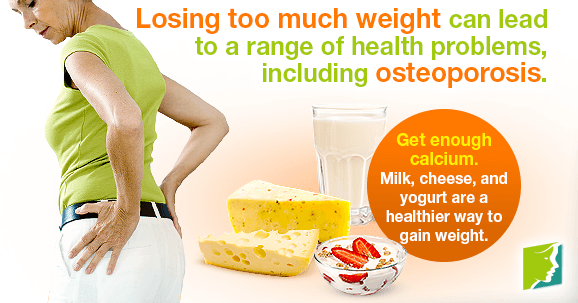Postmenopause is the time after a woman's menstrual periods have ceased completely and lasts for the rest of her life. The preconception is normally that unpleasant symptoms will cease once menopause is over, but unfortunately, it can be the case that postmenopause can bring some side effects of its own. Weight loss can often be a problem that affects postmenopausal women. Keep reading for more information about ways to gain weight healthily during this time.
Average Age of Postmenopause
All women experience menopause differently and at different times, so the average age of the beginning of postmenopause can vary. Generally speaking, the onset comes when a woman is in her 50s to early 60s, with the average age being 51. For various reasons, weight loss can be a problem for older women as they approach this age, so knowing healthy tips to gain weight is essential.
Is Weight Loss Dangerous?
Losing too much weight can be unsafe as it can lead to a range of health problems, including a weakened immune system, loss of energy, and fragile bones. The effect of too much weight loss on bones is particularly bad news for postmenopausal women, as the lack of estrogen is already increasing the risk of developing osteoporosis. Therefore, implementing healthy ways to gain weight and making sure your body mass index (BMI) is between the healthy parameters of 18.5 and 25 will reduce the possibility of developing this condition.
Healthy Ways to Gain Weight
It can be tempting to use the goal of gaining weight as an excuse to gorge on high-calorie, sugary junk foods and saturated fats, but these will have negative effects on your overall health and result in increasing body fat and not your lean body mass. To be sustainable and healthy, weight gain must be gradual and retain the principles of healthy eating. A few tips on ways to gain weight are outlined below.
Use starchy carbohydrates as a base for meals. This includes brown rice, potatoes, whole grain pasta, or lentils.
Eat lots of fruit and vegetables. This should be at least five per day, but preferably more. Snacking should be on fruit instead of junk food, as this will give your body the nutrients it needs to protect the immune system and strengthen bones.
Get enough calcium. Three portions a day is ideal - this could be from milk, yogurt, or cheese, for example. These foods are a healthier way to gain weight than getting your fats from processed meats, cakes, and cookies.
Change your eating habits. Switch to smaller meals and snack more frequently. This will keep your metabolism ticking and reduce the urge to choose unhealthy snack options.
Sprinkle cheese on your meals. Adding cheese to soups will also improve flavor and calorific value. Additionally, making mashed potato with milk and butter will improve the texture and also add a few more calories.
Replace one cup of tea or coffee per day with a cup of warm milk. This can be especially helpful at bedtime, as it has the added benefit of helping you fall asleep.
Although perimenopause may have brought weight gain with it, maintaining a healthy weight remains important during postmenopause, and this may mean gaining weight to achieve a healthy BMI. While it may be hard to see, gradual weight gain on a healthy diet is the best way to do this.
Sources
- Centers for Disease Control and Prevention. (2014). About BMI for Adults. Retrieved August 14, 2014, from http://www.cdc.gov/healthyweight/assessing/bmi/adult_bmi/index.html
- National Health Service UK. (2013). Over 60 and Underweight. Retrieved August 14, 2014, from http://www.nhs.uk/Livewell/over60s/pages/underweightover60.aspx
- National Health Service UK. (2014). Underweight adults. Retrieved August 14, 2014, from http://www.nhs.uk/Livewell/Goodfood/Pages/Underweightadults.aspx




